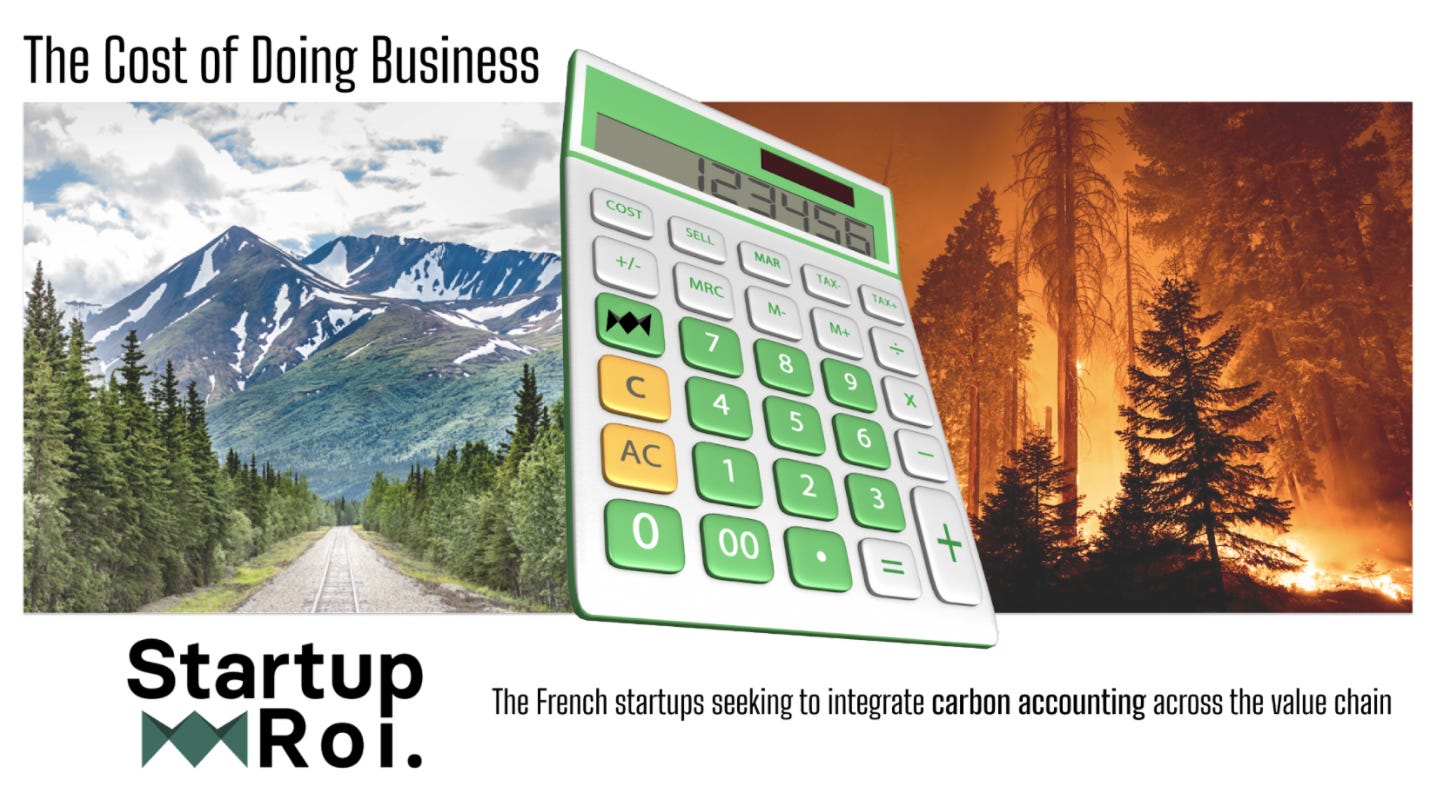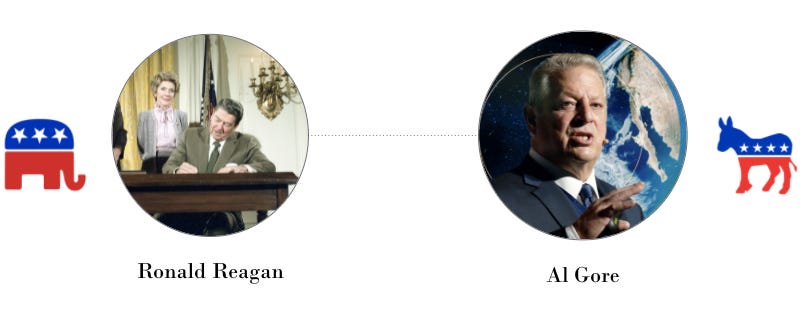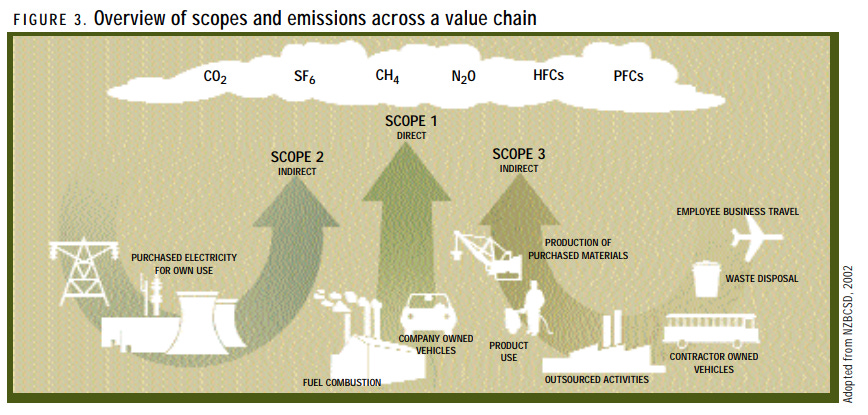🏭 The Cost of Doing Business
The French startups seeking to integrate carbon accounting across the value chain
Welcome to Startup ROI, where we explore global technology trends and how they manifest themselves in France 🇫🇷 . Whether you're an entrepreneur, investor or tech enthusiast, I'm glad to have you here!
Want to sponsor or collaborate? 📩 bonjour@startup-roi.com
Join me weekly for in-depth analysis on French Tech:
🎧 Listen to this week's article:
Today's piece on Carbon Accounting will begin with a quote from someone who is neither a climate expert nor an accountant. He's not known for his like-ability, but this particular observation speaks volumes about human nature and applies directly to the situation we find ourselves in today.
“A single death is a tragedy, a million deaths are a statistic”
– Joseph Stalin
We can all agree that a million deaths are, indeed, a tragedy. But the quote speaks to something deeper as it pertains to persuasion and action on a large scale. When a problem is small enough, relatable enough, personal enough to wrap your head around, you're simply more likely to do something about it. When we get into large, complex issues or are dealing with public goods (think tragedy of the commons) we tend to have trouble wrapping our heads around the issue, let alone feel encouraged to do something about it. That's why, for instance, ads requesting donations to solve child hunger feature a specific child with a face and a name that you can help. If the same NGO begged you to alleviate the entire African continent from starvation, you'd be statistically less likely to help. Wisely, many non-profits figured out how to appeal to this psychological flaw.
The Covid-19 pandemic has served as a great case study for this phenomenon. This, too, has been the case with the slow burn of climate change. Individuals feel powerless and governments have been unwilling to compromise. As always, there exists a sub-culture of flat out denial. Historically the problem has been too big or too distant to tackle despite the potential for a civilization ending event looming ahead. Fortunately, that sentiment has started to change, probably because the impact is shifting from abstract and global to personal and local. Until rather recently, the conversation has been driven by cooperative governments, but a combination of consumer demand and stakeholder capitalism has tipped the balance in favor of the free market: companies are starting to take responsibility and fill the gap where governments can't seem to align incentives. And by the way, it's no longer considered niche:
"The global carbon footprint management market is expected to grow from $7.76 billion in 2020 to $8.63 billion in 2021 at a compound annual growth rate (CAGR) of 11.3%"
– Carbon Management Global Report (Link)
Before we dive into the specifics, here's what we'll cover:
A quick history of climate concerns and regulation
How exactly do we track carbon emissions?
The advent of the Paris Climate Accord and increasingly disconcerting data
Offsets, contributions and greenwashing
Leveraging technology to get an accurate picture and begin goal-setting
The French startups building the foundation for transparency and accountability through carbon accounting
Déjà Vulnerability
Climate whistleblowers have made their case for decades now. But did you know that early climate regulation was actually a republican backed initiative? The ol' Gipper (Ronald Reagan) instituted cap and trade legislation to eliminate toxic lead from gasoline; the same technique helped reduce S02 emissions from power plants under George H.W. Bush; it was later extended under George W. Bush for the Clear Skies Act in 2002. For those unfamiliar with American politics, it's almost unthinkable that this would be a right-wing agenda item in today's party. But cap & trade was viewed as a "free market" policy, essentially condoning a certain amount of pollution each year, selling the rights to said pollution and opening a secondary market to buy and sell the right to pollute as a business. This approach actually far exceeded expectations but towards 2009 the GOP seemed to have forgotten they came up with the idea in the first place and pushed anti-regulation rhetoric to quash the Clean Energy & Security Act.
You may recall another politician and activist, Al Gore, famous for "inventing the internet" and his prophetic climate documentary An Inconvenient Truth (of which we are starting to feel the full effects). In the mid-2000s it wasn't uncommon to hear pundits write him off as an alarmist, but as dire predictions start to materialize it's been hard to look the other way. Fortunately, the past decade have brought us multilateral agreements like the Paris Climate Accord and annual conferences like COP26 to bring science, policy and technology front and center. Nevertheless, the problem remains abstract and intangible for the average person. A middle ground, however, seems to be forming at the corporate level: bigger than an individual (makes it feel like you're making a dent) and smaller than a nation (hard to build momentum in an increasingly polarized world). And believe it or not, a standardized framework for tracking emissions has been around since 2001! In some regards, we've reached a tipping point where it's a badge of honor (and marketing hype) to publicize your contribution to saving the planet. So much so we have to be weary of greenwashing – inflating your net-zero claims for the purpose of enhancing brand equity. So let's find out how exactly this framework is structured and how a digital transformation could seriously make an impact.
“Since the Paris agreement in 2015 we’ve seen remarkable progress, as nations and corporations have committed to net zero emissions, major automakers have committed to eliminating the internal combustion engine, and renewable energy has become cheaper than fossil fuels almost everywhere on Earth. But to avert climate disaster we cannot just do better – we need to do enough.”
– Andrew Steer, President and CEO, Bezos Earth Fund
Corporate (Carbon) Accounting for Dummies
When I conducted early research for this piece, I found the original PDF document from the early 2000s outlining the accounting principles necessary to create audit-proof emissions reports. I know what you're thinking: snoozefest! Tbh, same. But I powered through to get you some definitions crucial to understanding the model.
The main concept you need to understand are the three scopes of emissions reporting. Here they are:
Scope 1: Direct emissions from the company from creating their product (output from a factory) or in delivering services (combustion engine in a company car)
Scope 2: Indirect emissions resulting from energy purchases used to run the company (i.e. their electricity bill)
Scope 3: Indirect emissions produced all the way down the supply chain (if you buy an input from a supplier in China, then all the emissions associated with it's journey into your production line has to be included)
As you can imagine, the broader the scope the harder it is to track. Frankly, it sounds pretty hard to just track your own direct emissions properly. And I'm really over-simplifying this… There are rules for how everything applies across your organizational structure, how to identify various emissions-driven activity, and a database of emissions data (i.e. how much C02 is associated with X activity) so you can run the numbers. In order to do this properly you basically need a whole team of people with expertise (and the incentive to do it in the first place) which is why early adopters were limited to the Fortune 500 with the means, resources and brand equity to do so. Manually tracking this sounds painful, but that is changing which broadens the target audience.
It seems like every other day another company is announcing their net-zero emissions goals for 2030. If you watched the Superbowl, you probably saw million dollar advertisements for electric vehicles from legacy car makers hoping to capture market share from Tesla. These trends are heading in the right direction, but you might be asking yourself: how can a company like Delta Airlines (big polluter!) actually achieve net-zero emissions? The keyword here is net and the answer brings us to our next important definition: offsets. Carbon off-sets allow an organization to off-set (duh) their emissions by throwing money at the problem. Typically, it's something like buying enough trees to counteract your emissions surplus. It's imperfect, but better than nothing (and kind of sounds like a classic accounting loophole invented by the bean counters). The language around this is changing from off-sets to contributions, where instead of just "planting some trees" you can contribute to specific projects that are delivering emissions reductions like installing a renewable energy plant in Asia or an electrification project in a developing nation. Ultimately, the result is the same: if you can't eliminate your emissions, you'll have to make up for it through other means to claim your net-zero status.
A Green Sweep
Remember when I mentioned how hard it must be to track all your emissions manually? It's a pretty daunting task for large organizations due to scale and for small organizations due to resource constraints. Which is why two French startups have stepped in to fill the gap: Greenly and Sweep. They both serve as tools to democratize (ew, I know we need a new word) climate action for any and all businesses. They do this by providing the engagement, reporting and communication layer between your employees, enterprise software stack, and your emissions tracking. By harnessing the disparate data through powerful APIs they can create visualizations, set and track company goals, and automatically pull third party data to run calculations. That last part seems a bit vague: where do they get all the data on emissions activity and how is it consistent worldwide? The gold standard for emissions information is something called the ecoinvest database which stores over 18,000 activities that can be tracked and reported on. In short, you can pair internal event data with correlating emissions numbers with a strong degree of accuracy and automatically. These platform layers rely on this data to build real-time dashboards and personalized action plans.
Here's a concrete example. Let's say your company uses Salesforce for expense tracking. An employee charges a flight on the company card, the details of which (including destination and plane model) are stored following approval from their manager. By connecting Salesforce with Greenly, this type of event data can be automatically ported over to the emissions platform, it can run calculations and add the result to the ledger. In turn, dashboards broadcast status and emissions targets to employees and ESG managers alike for company-wide alignment. Voila!

From there, the possibilities are endless. And like any enterprise software implementation it depends on how you use it that will determine your success. Back when I worked at Salesforce there was a heavy dashboard culture: measuring everything and sharing it publicly. For sales this meant another team member could see how you were tracking towards your quarterly goal. For customer service it meant you could see your NPS score changing in real-time. For product it meant you could identify feedback and incorporate fixes or iterations rapidly. This kind of dashboard culture promotes accountability, something notoriously difficult to find even at high performing companies.
With elegant, insightful dashboards driving collective accountability these two companies will help transform climate action at SMBs and Enterprises around the world. The desire to change is already a part of the cultural zeitgeist, now with reduced friction in tracking and curated expertise around planning and goal-setting, leaders can start to put their money where their mouth is – and frankly, it's not that much money: Sweep runs for about $950/month for their "growth" plan. Sweep recently announced a $22M raise which followed Greenly's more modest $3M round in September of 2021.
A recent BCG report stated that over 90% of companies aren't measuring their carbon emissions properly. Well here's a chance not only to fix that but widen the playing field to get all types of companies on board with emissions tracking. I'm looking forward to witnessing these companies educate the market and normalize carbon accounting practices across the globe. In the next decade, I wouldn't be surprised if every company had a Chief Impact Officer responsible for ESG among many other business practices that are becoming the new normal.










